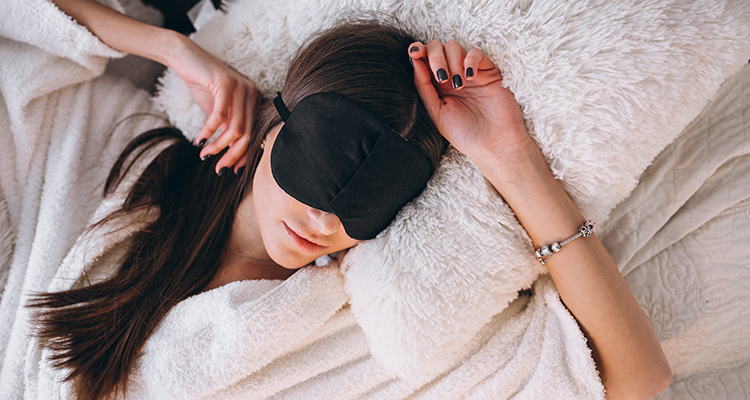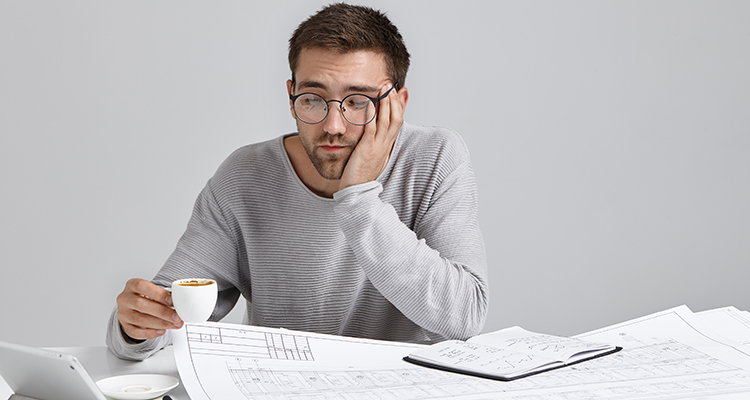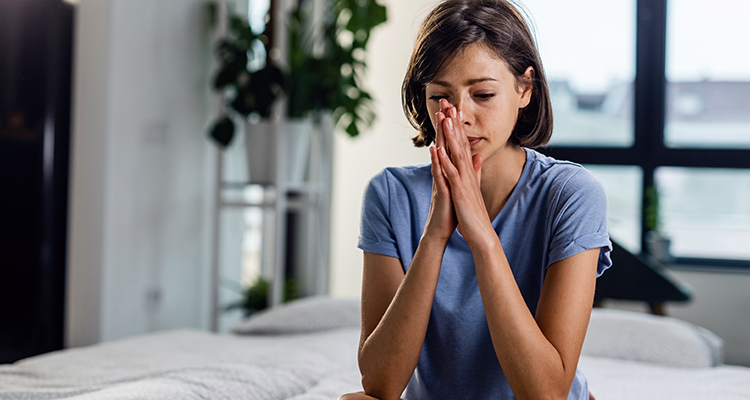How Long is Too Long? How Long Can You Go Without Sleep?
It’s no secret that sleep is vital to your health – both mentally and physically. Without adequate rest, you can’t function or perform daily tasks efficiently. But have you ever found yourself pushing the envelope or wondering just how long you can go without sleep? While this isn’t an experiment you should try, you may still be curious about just how long the human body can function without sleep.

In this article, we’ll explore how much sleep is sufficient, how long you can function without it, and what happens to the human mind and body after too many hours awake.
Content
How Much Sleep Should You Get and Why?
With the CDC recommending that adults get between 7 and 9 hours of sleep per night, if the thought of not sleeping at all seems dangerous and daunting that’s because it is. Chronic sleep deprivation is connected to a myriad of serious medical issues including heart disease, diabetes, high blood pressure, and stroke. Not to mention, several mental health disorders including depression and anxiety.

The human body requires sleep to function. Without it, your organs don’t get the oxygen and blood flow they need to sustain life. Additionally, your brain can’t function properly, causing significant impairment. Cognitive decline, memory loss, and an inability to focus are all early warning signs of sleep deprivation. The longer you go without sleep, the worse these symptoms become and the greater at risk you are for experiencing serious complications.
How Long Can You Go Without Sleep?
Despite knowing that you should get between 7 and 9 hours of sleep per night, you may still be wondering how long you can go without it. Whether shift work has your circadian rhythm misaligned, you’re planning an all-nighter, going on vacation, or you simply want to know how long the human body can function without sleep, there’s one question that needs to be answered first – what does it mean to be awake?

Sleep deprivation can force people into an altered state of consciousness known as microsleep. When a person becomes overwhelmed by fatigue, they briefly lose normal cognitive and motor functions. In 1965, as part of a science project, 17-year-old Randy Gardner set a World Record by staying awake for 264 hours which is the equivalent of about 11 days. At the end of the experiment, Randy was technically awake but deemed “cognitively dysfunctional.”
But for the sake of this article, we’ll focus on how long you can go without normal, quality sleep and remain awake, alert, and functional.
Why Do Some People Go Days Without Sleep?
It’s not common for people to go days on end without sleep. This usually occurs under extenuating circumstances. Here are a few reasons why you might find yourself awake for 24 hours or more.

Work Schedules
Whether you’re working overtime, shift work, or multiple jobs, you may find yourself awake for longer than you want, or is good for you. Certain work schedules might require you to stay awake for a double shift or overnight.
Shift work is especially damaging to your circadian rhythm. The human body isn’t designed to stay awake all night and then sleep all day. It’s difficult for some people to sleep while it’s daylight which may result in you staying awake all day until your next shift. When you finally do fall asleep, you may sleep well into the next day or afternoon and not be tired come nightfall on your day off. This inconsistent sleep schedule is unhealthy and can wreak havoc on your sleep-wake cycle.
Medication
While there are plenty of medications designed to help you sleep, there are also many that may make it difficult to fall asleep. Some of the most common medications associated with insomnia include:
- SSRI depressants
- Stimulants
- Nasal decongestants
- Corticosteroids
- Statins
- Beta-blockers
- ACE inhibitors
- Theophylline
- Thyroid hormone replacement
- Nicotine replacements
Each medication reacts differently within your body and brain, causing you to feel alert, aroused, and even agitated before bed. This can make it increasingly difficult to fall asleep and may cause nighttime anxiety over your inability to fall asleep. If your body doesn’t adjust to these medications over time, you may find yourself awake for more than 24 hours in a constant battle with yourself.
Mental Illness
Nearly 53 million adults in the US alone suffer from mental illness. That equates to 1 out of every 5 people. Many mental illnesses have a deep impact on the person’s life, ability to function, and you guessed it, sleep. In addition to anxiety disorders that cause racing, intrusive thoughts at night, or depression which can cause overwhelming sadness, certain, specific disorders can actually cause a person to be awake for hours or days at a time. Two such illnesses are bipolar and OCD.
One of the primary side effects of bipolar disorder is sleep disturbance. The disease itself causes extreme mood swings where a person switches from depressive lows to manic highs, often without warning. It’s during these manic episodes that sleep becomes out of reach. Many people suffering from mania feel a reduced need to sleep, as they feel a surge of energy and arousal.
Individuals with OCD are often plagued by unwanted, intrusive thoughts. The inability to control or prevent these thoughts means, sometimes, they strike at night. Obsessive thoughts can also trigger compulsive behaviors, making it impossible to stay in bed. For example, if the intrusive thoughts include fear of someone breaking into the house or leaving the stove on, the individual may get up repeatedly to check on these things. Until the person is satisfied that they’re safe, they may not be able to relax enough to fall asleep.
Morvan Syndrome
An extremely rare but serious medical disorder that can result in disrupted sleep is an autoimmune system known as Morvan Syndrome (MoS). Symptoms include a mix of neurological difficulties including hallucinations, muscle twitching, excessive sweating, pain, and agrypnia (severe loss of sleep).
One French study observed a 27-year-old male patient diagnosed with this disease who claimed he hadn’t slept for months. What’s even more surprising is that he didn’t express feelings of excessive drowsiness or sleepiness, nor did he show signs of mood swings, anxiety, or memory loss. The patient did, however, experience 20 to 60 minutes of hallucinations ranging from olfactory and auditory to visual and somesthetic as well as pain in his fingers and toes.
The Effects of Long-Term Sleep Deprivation
What happens when sleep deprivation extends beyond 72 hours or you catch some brief shut-eye but then fall back into an unhealthy pattern of being awake for days? Chronic sleep deprivation is defined as not getting enough sleep on a regular basis and is more common than not sleeping at all. Similar to going days without sleep, chronic sleep deprivation can have dramatic effects on your health. Most people experience short-term health risks that result in long-term complications.

These short-term risks include:
- Unstable mood
- Memory problems
- Drowsiness
- Anxiety
- Difficulty staying alert and concentrating
- Impairments at work or school
- Compromised immune system
- Other cognitive impairments
In the long term, you’ll notice a further decrease in immune functioning and a rise in your risk of developing certain health issues, including:
- Obesity
- Stroke
- Diabetes (type 2)
- High blood pressure
- Mental illness
- Heart disease
Tips for Promoting Sleep and Overcoming Insomnia
Depending on the cause of your insomnia, you can try several methods and techniques to finally fall asleep and recharge your brain and body. While some variables are out of your control, like your work schedule or certain illnesses, you can still incorporate a few of these tips to increase your chances of getting a good night’s rest.

Set a Sleep Schedule
This is one of the most important steps in preventing long stretches of sleeplessness caused by any of the above-mentioned triggers. Even if your work schedule doesn’t allow for a lot of sleep, you need to make it a priority and schedule it into your day, just like you do other important appointments.
Choose a time to go to bed that works for your current schedule and a time to wake up. Try to stick to this timetable regardless of the day or where you are. Doing so will help align your circadian rhythm, setting your internal clock and making it easier to fall and stay asleep.
Practice a Healthy Nighttime Routine
It’s also important to prepare your brain and body for sleep. Performing high-energy activities that promote arousal before bed is a sure-fire way to sabotage your sleep. Instead of scrolling through your phone, which can stop your brain from producing the sleep hormone melatonin, or hitting the gym (reserve this for earlier in the day), adopt a more relaxing nighttime routine. Things like listening to soothing music, taking a warm bath, writing in a journal, or meditating can all help relax both your body and mind and promote sleep. Keeping a sleep journal is especially beneficial in identifying the thoughts and behaviors that are triggering your sleep troubles.
Create a Positive Sleep Environment
You can’t fall asleep if your bedroom is bright, noisy, or messy. Creating a positive sleep environment makes it easier for you to drift to sleep. Reduce noise disturbances using a sound machine or oscillating fan. Block out bright lights with a sleep mask or room darkening shades. You should also invest in a quality mattress and bedding that keep you cool and comfortable. All of these variables work together to increase your chances of achieving quality sleep.
Reduce Stress and Anxiety
Because stress and anxiety are two of the leading causes of insomnia and are also side effects of many mental illnesses that can keep you awake for days, anything you can do to reduce these symptoms will only benefit you. Meditation and mindfulness are two proven methods for reducing anxious thoughts and promoting calm and relaxation. Exercise also works to release endorphins that promote happiness. Just be sure to exercise during your awake hours to avoid overstimulation too close to bedtime.
Change Your Thoughts About Sleep for Good
CBT-i (cognitive behavioral therapy for insomnia), is one of the most effective ways to help ease insomnia symptoms and improve your relationship with sleep. If you’re sleep deprived or are going days without sleep, you’ve probably developed a negative relationship with it. You may believe sleep is overrated or unimportant or you may feel increasingly anxious as night falls and you get closer to climbing into bed.

The CBT-i methods used in Somnus Therapy’s online sleep therapy program can help you replace these negative thoughts and feelings with more positive ones, increasing your chances of achieving the deep, restorative sleep you need. Click here to learn more about our methods and if this online therapy program is right for you.














